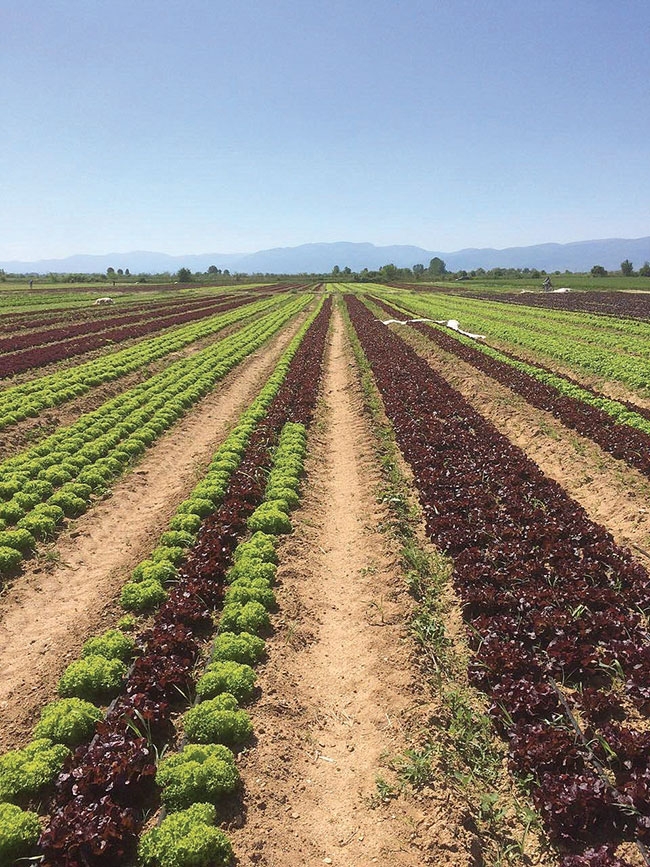
Features
Production
Profiles
International views: Bulgaria
Insights into fruit and vegetable production in Bulgaria with a visit to the Agroproduct Group farm.
November 29, 2019 By Chris McCullough
 The Agroproduct Group farm is based near Trilistnik village in the Plovdiv region of Bulgaria. Photo courtesy of Chris McCullough.
The Agroproduct Group farm is based near Trilistnik village in the Plovdiv region of Bulgaria. Photo courtesy of Chris McCullough.Alack of unoccupied land available in the eastern European country of Bulgaria is slowing down expansion plans for a local fruit and vegetable grower.
Krasimir Kumchev is the owner of the Agroproduct Group Ltd. farm based near Trilistnik village in the Plovdiv region of Bulgaria. He grows a wide variety of fruit and vegetables on the farm that extends to 80 hectares but would like to
grow more.
“I established our farm back in 1998. I am the majority shareholder and for the past three years my two sons, Peter and Hristo, work with me and manage the farm,” Kumchev says. “We farm 80 hectares in total with 51 hectares in fruit trees growing apples, cherries and plums. On the remaining 29 hectares we grow green salads, iceberg lettuce, Lolo Rosso, endivia, lattuga, broccoli and melons.”
With excellent soils and growing climatic conditions in Bulgaria the crop yields on Kumchev’s farm are respectable. The farm’s production manager plays a pivotal role in ensuring the yields are as good as they can be.
“Each stage of the production system is under the control of our production manager, Petar Kumchev. He carefully manages the ground preparation, seeding time, harvest time, fertilizer and spraying times,” Kumchev explains. “When it comes to yields, all our crops harvest very well. On average the apples yield 40,000 kg per hectare, the plums yield 35,000 kg per hectare, melons 40,000 kg per hectare and the salads 100,000 units per hectare.
“All of the production is sold via the big local retail chains including Billa, Metro, Lidl and Kaufland,” he said.
Kumchev and his sons would like expand the farm but there are some challenges when it comes to sourcing additional land to grow more crops.
“Yes, we do have plans to expand, but a limiting factor is the lack of unoccupied land. Having this in mind, we will expand if and when land is available,” Kumchev says. “This is hard to predict and we are also looking into investing in a facility to process some of our yield, which should save us some production costs as well.”
Kumchev has no immediate plans to export his produce to Europe but has other ambitions he would like to achieve.
“For the near future, we have no plans to export. However, we are interested in a partnership with a foreign party for processing bio plums, dried, puree or anything that is of mutual interest. Our annual production of plums is around 600,000 to 700,000 kg.”
European Union (EU) subsidies and sourcing labour are two topics that are discussed widely among farmers in Bulgaria but not always in a positive way.
“We use the same subsidies as the other producers in our country. However, it is not enough compared to the other members of the EU. In that sense, we are left in a different competitive state. Personally, I appeal for the subsidisation to be equal in all of the different EU member states.”
Kumchev employs 17 full-time employees and around 20 to 50 seasonal workers. Harvesting is mostly done by hand, not machine.
“The cultures that we grow on the farm do not allow for the use of machines. Harvesting is done by hand and sourcing labour is a huge problem for us as thousands of Bulgarians go abroad and work in farms in different countries within the EU,” he explains. “If we were offering the same conditions as the other countries, the workers would stay in Bulgaria and work.”
“Bulgaria presents excellent growing conditions for vegetables and fruits. The taste characteristics are unmatched and, in that sense, we could potentially provide Europe with high quality products.” he adds.
Print this page